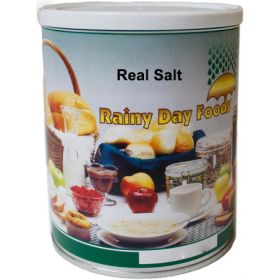 Redmond Salt
Why should you use it?
Unrefined sea salt has become increasingly mainstream in the last few years, and its fans rave constantly about it—specifically, about its preferable flavor as well as its health benefits. That may come as a surprise to you, especially if you’re familiar with salt as that thing that you’re supposed to limit in your diet. But as it turns out, unrefined sea salt has some real advantages over conventional refined salt.
A basic course in nutrition will teach you that many nutrients don’t work well alone. Like a codependent girlfriend, they need a partner to give them purpose. Sometimes these partner nutrients work symbiotically to become something greater, sometimes they keep each other in check, sometimes they compete, and sometimes they cancel each other clean out—much like with people, it depends on the pairing. Calcium’s buddy is Vitamin D (suddenly those fortified milks make more sense), Vitamin B12’s is folate, and cancer-fighting lycopene’s is fat. This is one of the reasons we are encouraged to get as many nutrients as possible through a varied diet instead of vitamin supplements.
Similarly, sodium is best when paired with potassium—which occurs naturally, along with about 60 other trace minerals, in Real Salt. Potassium helps mitigate some of sodium’s more potentially problematic effects by encouraging the kidneys to excrete excess sodium. It’s a check and balance put in place by nature. That’s one of the reasons we leave Real Salt’s full mineral profile in place—we really do think that when it comes to salt, nature got it right. Conventional refined table salt (the white salt most of us grew up using) simply doesn’t give your body the minerals it needs to most effectively use sodium.
Redmond Salt
Why should you use it?
Unrefined sea salt has become increasingly mainstream in the last few years, and its fans rave constantly about it—specifically, about its preferable flavor as well as its health benefits. That may come as a surprise to you, especially if you’re familiar with salt as that thing that you’re supposed to limit in your diet. But as it turns out, unrefined sea salt has some real advantages over conventional refined salt.
A basic course in nutrition will teach you that many nutrients don’t work well alone. Like a codependent girlfriend, they need a partner to give them purpose. Sometimes these partner nutrients work symbiotically to become something greater, sometimes they keep each other in check, sometimes they compete, and sometimes they cancel each other clean out—much like with people, it depends on the pairing. Calcium’s buddy is Vitamin D (suddenly those fortified milks make more sense), Vitamin B12’s is folate, and cancer-fighting lycopene’s is fat. This is one of the reasons we are encouraged to get as many nutrients as possible through a varied diet instead of vitamin supplements.
Similarly, sodium is best when paired with potassium—which occurs naturally, along with about 60 other trace minerals, in Real Salt. Potassium helps mitigate some of sodium’s more potentially problematic effects by encouraging the kidneys to excrete excess sodium. It’s a check and balance put in place by nature. That’s one of the reasons we leave Real Salt’s full mineral profile in place—we really do think that when it comes to salt, nature got it right. Conventional refined table salt (the white salt most of us grew up using) simply doesn’t give your body the minerals it needs to most effectively use sodium.
Redmond Salt
 Redmond Salt
Why should you use it?
Unrefined sea salt has become increasingly mainstream in the last few years, and its fans rave constantly about it—specifically, about its preferable flavor as well as its health benefits. That may come as a surprise to you, especially if you’re familiar with salt as that thing that you’re supposed to limit in your diet. But as it turns out, unrefined sea salt has some real advantages over conventional refined salt.
A basic course in nutrition will teach you that many nutrients don’t work well alone. Like a codependent girlfriend, they need a partner to give them purpose. Sometimes these partner nutrients work symbiotically to become something greater, sometimes they keep each other in check, sometimes they compete, and sometimes they cancel each other clean out—much like with people, it depends on the pairing. Calcium’s buddy is Vitamin D (suddenly those fortified milks make more sense), Vitamin B12’s is folate, and cancer-fighting lycopene’s is fat. This is one of the reasons we are encouraged to get as many nutrients as possible through a varied diet instead of vitamin supplements.
Similarly, sodium is best when paired with potassium—which occurs naturally, along with about 60 other trace minerals, in Real Salt. Potassium helps mitigate some of sodium’s more potentially problematic effects by encouraging the kidneys to excrete excess sodium. It’s a check and balance put in place by nature. That’s one of the reasons we leave Real Salt’s full mineral profile in place—we really do think that when it comes to salt, nature got it right. Conventional refined table salt (the white salt most of us grew up using) simply doesn’t give your body the minerals it needs to most effectively use sodium.
Redmond Salt
Why should you use it?
Unrefined sea salt has become increasingly mainstream in the last few years, and its fans rave constantly about it—specifically, about its preferable flavor as well as its health benefits. That may come as a surprise to you, especially if you’re familiar with salt as that thing that you’re supposed to limit in your diet. But as it turns out, unrefined sea salt has some real advantages over conventional refined salt.
A basic course in nutrition will teach you that many nutrients don’t work well alone. Like a codependent girlfriend, they need a partner to give them purpose. Sometimes these partner nutrients work symbiotically to become something greater, sometimes they keep each other in check, sometimes they compete, and sometimes they cancel each other clean out—much like with people, it depends on the pairing. Calcium’s buddy is Vitamin D (suddenly those fortified milks make more sense), Vitamin B12’s is folate, and cancer-fighting lycopene’s is fat. This is one of the reasons we are encouraged to get as many nutrients as possible through a varied diet instead of vitamin supplements.
Similarly, sodium is best when paired with potassium—which occurs naturally, along with about 60 other trace minerals, in Real Salt. Potassium helps mitigate some of sodium’s more potentially problematic effects by encouraging the kidneys to excrete excess sodium. It’s a check and balance put in place by nature. That’s one of the reasons we leave Real Salt’s full mineral profile in place—we really do think that when it comes to salt, nature got it right. Conventional refined table salt (the white salt most of us grew up using) simply doesn’t give your body the minerals it needs to most effectively use sodium.

